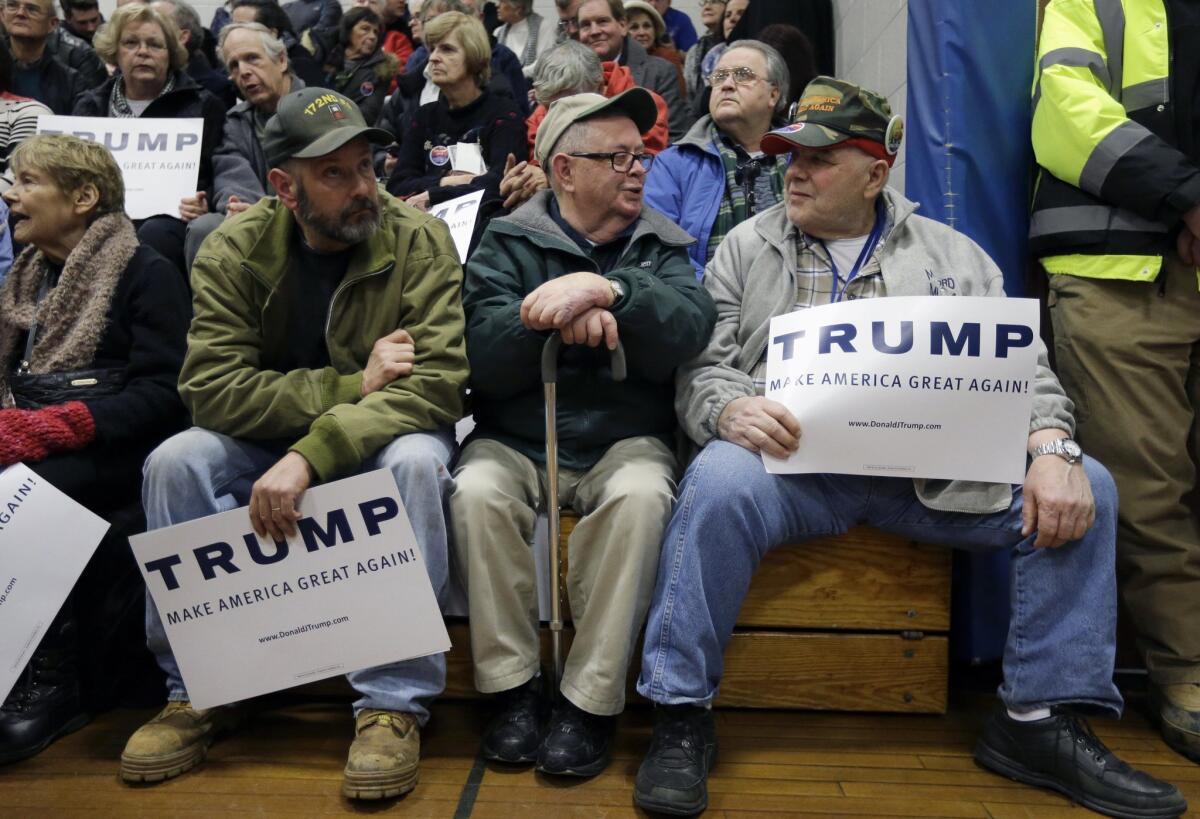Column: Donald Trump, Jeb Bush and other things I got wrong in 2015

Supporters of Republican presidential candidate Donald Trump talk while waiting for the start of a Trump campaign event on Dec. 28 in Nashua, N.H.
The biggest political story of 2015 was the rise of Donald Trump — but if you were reading my column, you almost missed it.
For most of the year, I barely mentioned the possibility that the braggadocious mogul could be a serious candidate for the Republican presidential nomination. And when I did look at Trump, I dismissed his prospects as “imaginary” — a judgment that turned out to be flat wrong.
Instead, I advised readers to keep their eyes on Marco Rubio, Jeb Bush and Scott Walker. If you’re keeping score, only one of the three, Rubio, is now in the top tier.
Newspaper columnists are rarely accused of humility; we’re paid to have opinions, the brassier the better. But a look back at a year’s work is enough to make even a pundit feel a pang of remorse.
I spent too much time talking with GOP grandees and too little time on the ground in states like Iowa, which is where a few reporters first noticed that Trump was real.
In my case, it took me until September to notice that Trump was the one drawing the crowds. By then, even elders of the Republican establishment were realizing that his insurgent candidacy was real. “It’s hard for me to say this, but he actually seems to be getting better as a candidate,” former Rep. Vin Weber, a Bush supporter, told me.
I wasn’t the only pundit who was slow to recognize Trump’s appeal — far from it. Some organizations initially refused to cover his speeches as news. Many reporters, including me, expected that Trump’s farrago of insults — against Mexicans, against Sen. John S. McCain, against Fox News anchor Megyn Kelly — would drive voters away. In fact, it only made him more popular.
We underestimated the anger of many voters at conventional politicians. We underrated the popularity of Trump’s anti-immigrant message, especially among blue-collar workers who feel as if they’re competing with immigrants for jobs.
Join the conversation on Facebook >>
And I, for one, overestimated the ability of well-funded establishment candidates to push back.
“If money matters — and, as any campaign manager will tell you, it does — there are only four candidates with a real shot: Bush, [Ted] Cruz, Rubio and Walker,” I wrote in July.
It turned out I spent too much time talking with GOP grandees and too little time on the ground in states like Iowa, which is where a few reporters first noticed that Trump was real.
“If the Trump campaign were being conducted by anyone else, journalists would take it quite seriously,” conservative columnist Byron York wrote as early as — ouch — May.
I wasn’t wrong about everything on the campaign trail. I noticed back in April that Bush was in trouble, despite his impressive $114-million war chest. “Many Republicans — not only the ones on talk radio — want a fighter, not a lover,” I wrote.
And I could tell that Ben Carson, an appealing figure as a surgeon and an inspirational speaker, would have a hard time measuring up as a potential president. “His speeches, interviews and books betray a shaky grasp of economic and foreign policy — to put it kindly,” I wrote. Many of Carson’s former supporters have now come around to that view.
On the Democratic side, it was easier to figure out what was going on.
“Democrats are having a primary campaign that’s actually quite traditional,” I wrote. “Just as in past years, it pits a fiery candidate from the party’s progressive wing against a more establishment figure. And [Hillary] Clinton has done what any establishment candidate would: She’s told voters she shares their anger, and has tried to dilute [Bernie] Sanders’ appeal by sidling leftward on economic policy.”
There were important stories outside the presidential campaign, of course, and I managed to get some of those wrong too.
For example, I underestimated House Speaker Paul D. Ryan’s chances of pulling Republicans in Congress together after the resignation of his predecessor, John A. Boehner.
“The sensible thing at this point might be for the Republican conference to split. After all, it’s already operating as an unstable coalition of two mini-parties,” I argued. “That won’t happen in our system. Republicans will keep their majority — but it still won’t be a ... workable majority.”
Not true; Ryan managed to pass a spending bill, avoiding a fiscal crisis at the end of the year.
Finally, one of my columns suffered from a severe case of poor timing.
After the November terrorist attacks in Paris, I wrote that the biggest danger was overreaction as Trump and others called for restrictions against Muslims entering the United States.
“It’s not clear how effective any of those ideas would be at stopping would-be terrorists from entering the United States,” I wrote. “But all those measures would reward Islamic State by bolstering its sales pitch to young recruits that Western countries are unremittingly hostile to Muslims.”
Only three days later, a Chicago-born fanatic and his Pakistani-born wife killed 14 people in San Bernardino.
Did that make my advice wrong? I don’t think so — just harder to take.
“The fear of terrorism isn’t gone, far from it,” I wrote. “But since 2001 we’ve learned to live with that fear and to refuse to allow it to disrupt our lives. That’s a good thing.”
I still think that’s true. So in that old-fashioned American spirit of calm and confidence, I wish every reader a happy — and anxiety-free — 2016.
Twitter: @doylemcmanus
Follow the Opinion section on Twitter @latimesopinion and Facebook
More to Read
A cure for the common opinion
Get thought-provoking perspectives with our weekly newsletter.
You may occasionally receive promotional content from the Los Angeles Times.











